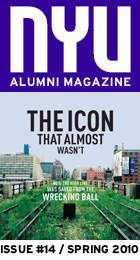dentistry
Handling With Care
students help victims of torture cope with trips to the dentist
by Kevin Fallon / CAS ’09
Harsh, blinding lights; the piercing sound of a drill; a stranger wielding sharp, metal tools near your face. Most people dread, yet deal with, these discomforts when they visit the dentist. But for victims of torture and sufferers of post-traumatic stress disorder, the experience can be infinitely more intense, reminding them of a time when they were subjected to horrors at the hand of someone who intended them bodily harm.With this in mind, a dozen select students are learning the nuances of treating these patients as part of the College of Dentistry’s Program for Survivors of Torture. Launched in September 2008 as the first of its kind in the nation, the program offers free dental services to survivors of torture and war traumas from more than 80 countries. The student dentists—trained by social workers, psychologists, translators, and immigration lawyers—treat up to 25 patients each week at the College of Dentistry and, to help prepare, sometimes even sit-in on patients’ physical exams or therapy sessions. “The goal is to give back to patients whose dignity has been taken,” says Steven Resnick, clinical assistant professor at the dental college and co-director of the program.
The challenges and obstacles to treating these patients are wide-ranging. Some have been tortured by sleep deprivation, usually by being subjected to constant bright lights and loud noises. “So you wouldn’t just flip on the light and shine it in their eyes,” Resnick says. Instead students start with it pointed to the floor, and slowly bring it up to the mouth. Survivors of waterboarding are often bothered by the suction hose, so they are allowed to hold it themselves to maintain control. Dentists must also reconsider machines that give off a burning smell, which may remind some of being scorched with lit cigarettes, and dental masks, which may trigger fears of suffocation. Perhaps the most complicated factor, however, is that doctors were often complicit in the torture, notes co-director and clinical assistant professor June Weiss, so it can be difficult to gain trust or to persuade patients to sign consent forms, as many were once forced to sign false confessions. The key is to give detailed explanations of every step of every procedure, says Weiss, noting, “even down to ‘I’m going to put water in this cup.
The program is a companion to Bellevue Hospital Center’s Program for Survivors of Torture, launched in 1995 in response to New York City being a common refuge for those fleeing persecution in their home countries. While Bellevue provides comprehensive medical care, mental health care, social services, and legal services to victims of torture, war traumas, and their families, patients with dental issues had limited options. But the new program goes beyond just treating cavities and gingivitis. For example, dental students helped one patient quit chain smoking. He’d started as a way to cope with his ordeal, but lighting up inevitably brought back haunting memories. Another patient received a permanent appliance to fill the hole where several teeth had been knocked out by a rifle butt, so she no longer had to remove her denture daily and relive the violence. As Resnick says: “The question for these dentists is not just how good was this root canal therapy, but what impact did it have on the patient’s life?”







